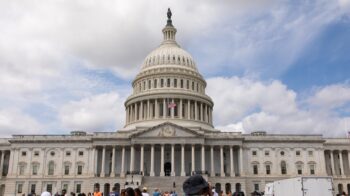
National Guard leaders brief reporters at the Pentagon Feb. 12 on Space National Guard
PENTAGON: Frustrated with the slow pace of decision-making on the issue, National Guard leaders in states with space units are openly advocating in Congress for the creation of a Space Force National Guard.
“As the adjutants general, we are individually approaching our congressional delegations,” Maj. Gen. David Baldwin, adjutant general of California, told reporters at a briefing today. “We are strongly advocating for a Space National Guard, and we are being received very well by the members on the Hill.”
Baldwin’s counterpart from Colorado, Maj. Gen. Mike Loh, said the question of a Space Force Guard and Reserve component was left up in the air in its first report on Space Force organization to Congress delivered Feb. 3 by Air Force Secretary Barbara Barrett. Guard leaders were expecting a positive decision to be reflected in that report: “That’s why,” he said, “I’m concerned.”
Guard leaders argue that a Space National Guard is required to keep the roughly 1,500 guardsmen who specialize in space operations for the Army and Air National Guard aligned with their active duty counterparts. If those personnel remain in their current chain of command, there could be future disconnect in training and equipment being used by active duty and guard troops.
Further, Guard leaders said, if the current organization is maintained, there will be an extra step in the chain of command for calling up guard space professionals — in that the Chief of Space Operations, currently Air Force Gen. Jay Raymond, will have to go to the Air Force and Army secretaries to get permission.
Finally, they argue, space professionals in the Guard bring a high-level of expertise into the military because they have “day jobs” in industry and academia in space specialities.
Brig. Gen. Patrick Cobb, deputy director of space operations at the National Guard Bureau headquarters, explained that DoD is still working on the issue of how to organize Guard and Reserve forces to support the new Space Force, stood up on Dec. 20 when President Donald Trump signed the 2020 National Defense Authorization Act (NDAA) into law.
“It is a work in progress,” he said, noting that Guard leaders are hopeful a request for a Space National Guard will go to the Hill with the next Space Force organizational report due March 19. But “it’s not hot jello; it’s warm jello,” he quipped.
The Office of Secretary of Defense is still “doing their due diligence” and studying all possible options for how to organize a Space Force reserve component, Baldwin explained. These include not having a reserve component at all, he said. It includes “a totally different model, where you have a one-component force that has full-time people, and part-time people — but not a reserve component, and we don’t really know what that means.”
Baldwin said that within the Air Force, there is support for the Space National Guard among most senior leaders for a reserve component within the Space Force, including a separate Space Guard.
According to the Guard leaders, this is because there is an understanding that the creation of a Space Guard will not involve significant new funds, nor will it require setting up new Space Guard units in all US states and territories that would lead to massive bureaucratic bloat. Instead, the plan would be to simply shift the current space units found in eight states and one US territory: Alaska, Arkansas, California, Colorado, Florida, Hawaii, New York, and Ohio, plus Guam.
Hawaii boasts the newest Air National Guard Space Control Squadron, the first in the Indo-Pacom region, said Maj. Gen. Ken Hara, who took his position as Adjutant General Hawaii Dec. 19. It is expected to reach initial operational capability at the Barking Sands Pacific Missile Range Facility in Kauai. The unit will be undertaking both “offensive and defensive counterspace and space situational awareness” according to written talking points provided to me. In effect, Hara said, the offensive part means electronic warfare actions.
Baldwin said it is currently unclear how long Congress will wait for a decision. “When they’re going to act and whether they allow OSD to go through their process to come to the conclusion on their own that we need a Space National Guard, or we leverage Congress and have Congress just put it in the NDAA and make it happen remains to be seen.”
Lockheed Martin projects potential $1 billion loss on classified program
Lockheed CFO Jay Malave said the company currently expects the program to become profitable on an annual basis around the 2028 timeframe.


























